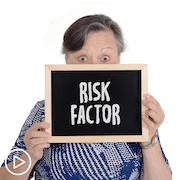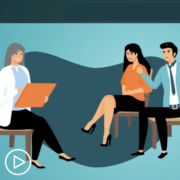How Could Emerging CLL Treatments Impact Your Care?
How Could Emerging CLL Treatments Impact Your Care? from Patient Empowerment Network on Vimeo.
In the changing world of chronic lymphocytic leukemia (CLL) research, how can emerging treatments impact care for patients? Dr. Jennifer Woyach shares information about targeted therapies, immunotherapy and clinical trials, and explains why she is hopeful about the future of CLL care.
Dr. Jennifer Woyach is a hematologist-oncologist specializing in chronic lymphocytic leukemia (CLL) at Ohio State’s Comprehensive Cancer Center – James Cancer Hospital & Solove Research Institute. Find out more about this expert here.
Related Resources

|

|

|
Transcript:
Katherine:
That’s a good point. Are there emerging treatments patients should know about?
Dr. Woyach:
Yeah. There are a lot of really exciting things going on in CLL right now. And CLL is a disease that has been completely transformed in the last five to 10 years and is poised to do so again. So, I mentioned these therapies that we use for frontline treatment, and there are clinical trials now combining them together. So, these agents work so well on their own. Are they going to be even better if we add them together?
There are also newer target therapies, different targets that we are finding increasingly important in CLL, as well as a modality called CAR-T cells, which most people have heard of where we take patients’ own T cells, modify them in the lab and then, give them back with a goal of getting those cells engineered to kill CLL cells.
These are all things that are not ready for prime time in CLL yet but are available in clinical trials. And I think one other thing I’d really like to put a plug in for is clinical trials in CLL, because right now we’re at a point where our therapies are really very good. But if people just do those treatments, we are never going to figure out which one is the best or figure out, for specific types of patients, which treatment is the best. And so, I advocate that any of my patients that are eligible for clinical trials should consider them, because that’s how we make progress in the disease from an altruistic sense.
That’s how we make things better for everybody. That’s one way a patient can think about it. But more personally than that, being in a clinical trial gives somebody the opportunity to get a treatment that they otherwise wouldn’t get that might be better than our standard of care therapies.
Katherine:
Dr. Woyach, as a researcher in the field, why are you hopeful?
Dr. Woyach:
I am so hopeful in CLL because there is so much that we’re learning every day about the biology of the disease, about specific mutations and other genetic factors that are important and really can be targeted by new drugs. Paralleling our understanding of the disease, there also are many more techniques to make these targeted therapies that kill cancer cells selectively while sparing normal cells and making our drugs even more tolerable.
And I think both the targeted therapies like this and the potential of combining them, figuring out sequences that are best but then, also these newer modalities where we, actually, get the immune system involved like the CAR-T cells. They’re making CAR NK cells now. And just lots of other strategies that could be used together with targeted therapies to, hopefully, cure the disease.










